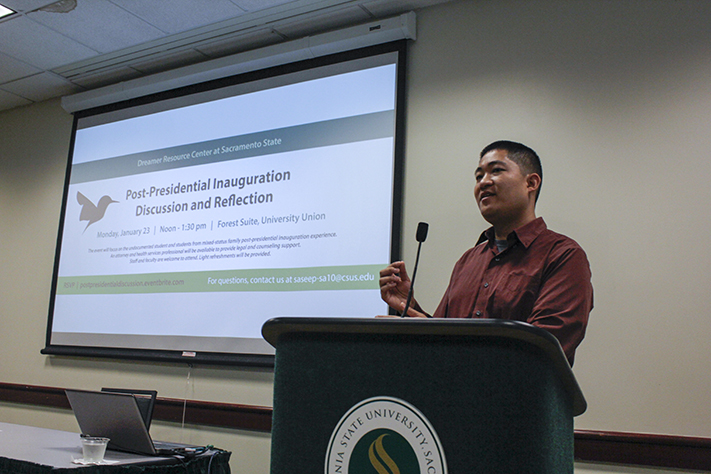An immigration attorney gave a presentation in the University Union on Monday and answered questions about what undocumented students can expect from President Donald Trump.
Marcus Tang of the California Rural Legal Assistance Foundation focused his remarks on students who are currently shielded from deportation by Deferred Action for Childhood Arrivals (DACA), which was instituted by former President Barack Obama.
“The Trump administration has not given us very much guidance about what they will do with DACA,” Tang said. “Because of how unpredictable this particular candidate was, it is hard to predict exactly what will happen. We can only talk about what we know and what we don’t know.”
DACA, first instituted in 2012, allows certain undocumented immigrants a two-year renewable deferment from deportation provided that they came to the United States before they were 16, are in or have graduated high school and do not “pose a threat to national security,” among other requirements.
DACA participants are allowed to be legally employed in the United States. Nevertheless, Tang warned, signing up for DACA did not change anyone’s immigration status. He compared it to highway patrol officers deciding not to patrol people driving two miles over the speed limit.
“It is prosecutorial discretion,” Tang said. “President Obama, the chief prosecutor at the time in 2012, decided that a certain group of individuals in the country who should not be a priority for deportation.”
From when he launched his campaign until the present time, President Trump has given conflicting statements pertaining to DACA, which complicates the situation for DACA participants.
“DACA is not something (Trump) views as constitutional, that he wants to get rid of it, that he wants to deport 12 million people, but then recently it seems like he only wants to prioritize people with criminal convictions,” Tang said. “Even more recently, a few minutes ago, the press secretary said it wasn’t one of his priorities to get rid of DACA immediately.”
Viridiana Diaz, the director of the College Assistance Migrant Program at Sacramento State, said that the school is trying to keep up to date with news from Washington and separate truth from rumor.
“We continue to be in this limbo, this phase of uncertainty,” Diaz said. “I’m glad to see staff and faculty here today because our students are reaching out to you, they’re reaching to us, for support and for information because they’re hearing things in the news and they’re reading things in the newspaper … coming to us for clarification.”
Tang reminded those in attendance that so-called “sanctuary cities” have different policies from one another about the extent to which their police departments will cooperate with U.S. Immigration and Customs Enforcement (ICE).
When asked if DACA students should seek to renew their participation at the end of their current deferment, Tang said that people have to make up their own minds after weighing the benefits with the risks.
“The DACA application fee is $495, so you could very well be submitting a renewal application to a program that will be terminated and you will not be refunded that money,” Tang said. “If DACA is not repealed … then obviously applying for DACA would allow you to keep your benefits.”
Tang also discussed a bill proposed by Sen. Lindsey Graham, R-S.C., and Sen. Dick Durbin, D-Ill., which if enacted would make certain DACA protections into law.
Dreamer Resource Center assistant Norma Mendoza said that the presentation was also an opportunity for the school to check on students who feel anxious about their future in the country after the presidential transition.
“I know that there are some students who’ve been affected by this whole situation and we want to give people the opportunity to express and check in,” she said.
An immigration attorney will be available each Monday going forward from noon to 2 p.m. in the Dreamer Resource Center.































































































































